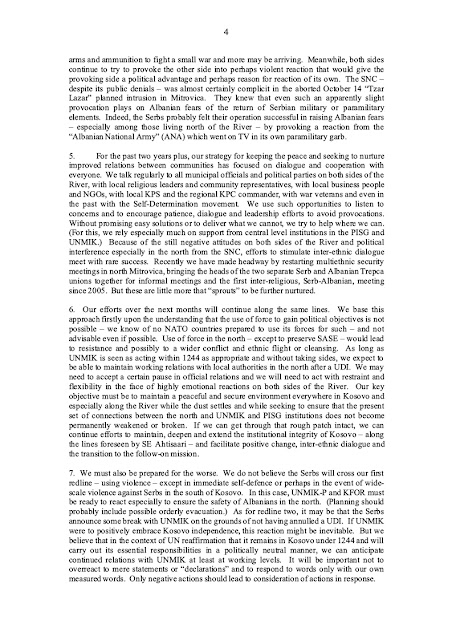In April 2007, the EU began to ready for assuming its role in a "post-independent" Kosovo and sent its EU Planning Team (EUPT) to begin coordinating with UNMIK on its plans to take our place. In UNMIK Mitrovica's first meetings with the EUPT in Pristina, it was clear that the the EU people believed they were the knights on white horses sent to clean up the mess left by the UN. They were not much interested in our views and wanted from us only what was necessary to leave the stage for them. Things didn't work out that way and as of February 2019, both UNMIK and the EU are still there. Indeed, it was only years later that the EU was allowed to place staff (other than police) in the north. Here follows the minutes of the first meeting of the Mitrovica Task Force formed to start planning for the establishment of the EU''s International
Civilian Office (ICO) that they saw becoming the new boss in Mitrovica. They proved to be clueless. (Two more meetings were held and those minutes will follow.)
November 2, 2006
Minutes of the Task Force on the Mitrovica Area meeting
Participants:
Gallucci, Efimov (both UNMIK), Daca (OSCE), Carver, Stadler (both ICO
PT), Zuccarini (EUPT), Guehenneux, Bruno (KFOR)
Ad
2) The Task Force (TF) agreed on its main goals: to identify and
analyze key issues in the region that needed international attention
regarding the transition and status periods, and to present
policy-makers with options (“TO DO” list) for addressing those
issues, namely in 3 areas: 1. list of potential breaches of the
status settlement (i. e. parallel structures), 2. list of priorities
of implementation of the settlement in the North and 3. tool-box to
enforce the implementation (sticks and carrots).
Ad
3) The TF identified and reviewed advantages and disadvantages to
locating the International Civilian Office - Mitrovica (ICOM) on
either side of the Ibar. Several participants noted the need for
access and the value of exposing the two major ethnic groups to each
other, which could be more easily achieved by an office in southern
Mitrovica. Some participants voiced concern that locating an office
in northern Mitrovica could be interpreted as endorsing a partition
of Kosovo. Others thought that an office in the northern part sends
more proper political message, since the ICOM’s target population
would mostly be K/S. The TF agreed that it is difficult to judge the
physical security advantages of either location without knowing what
the security environment will be under status. It was noted that good
coordination with EUPT will be needed when deciding on the physical
location of ICOM to plan and deploy ESDP component accordingly.
Ad
4) The TF reviewed possible numbers of ICOM staff members and
discussed the option of maintaining ICO personnel in each of the
northern municipalities. TF members observed that such a presence
could provide the ICO more and better opportunities to intervene in
status implementation issues; besides it would actually offer direct
help and guidance to K/S locally. Such an ICO presence could also
reassure Albanian minorities in those municipalities as well as
demonstrate that the ICO would not allow partition of the north from
the rest of Kosovo. TF agreed that ICOM would be the only
communication link between Pristina and the North. Some participants
noted the double standard of maintaining a presence in the northern
municipalities while not doing so in the southern ones. The majority
of participants supported the option of co-locating one ICO advisor
in the OSCE field office in each of the municipalities at least part
of every work day with the ICO branch office located in northern
Mitrovica.
Ad
5) The TF identified several issues for possible review in future
meetings (ranking below does not necessarily correspond to accurate
prioritizing):
-
property: linked to returns (particularly of K/A to the North),
including social housing and rental schemes;
-
privatization, with the core case of Trepca, linked to pensions;
-
economic decentralization with infrastructure and utilities
(electricity, water, phone lines, media transmission);
-
economic development and job creation;
-
freedom of movement (returns and security issues); transportation;
travel documents and licence plates;
-
security and the rule of law mission (core case of the Bridge);
-
financial transactions and money flows; currency;
-
modalities of implementation of the new decentralization: replacing
the UAM;
-
the university and the hospital: any new arrangements;
-
the parallel courts and police;
-
future of the KPC (in the North);
-
facilitation of inter-ethnic contacts and cooperation;
-
public communication strategy and access to the media.
Ad
6) The TF agreed to meet Thursday, November 9, 11:00 a.m. – 1:00
p.m., in the ICO PT offices in Pristina to discuss security issues.








